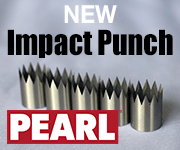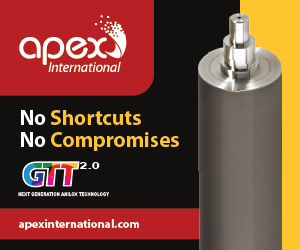Prime Labels Are More Than a Family Affair
- Published: September 01, 2001, By Edward Boyle, Contributing Editor
Purchased in part to serve divisions in its parent company, Prestige Label has fulfilled that role with excellence while building up a broad and impressive outside customer base.
When most end-users become disenchanted with the level of quality and service they are getting from label and packaging suppliers, they simply look to another of the nation's more than 3,000 label converters to serve them. Central Financial Group took that search one step further by purchasing its own label company.
Its acquisition five years ago of Prestige Label, now headquartered in Brooklyn, NY, not only fulfilled the internal needs of the company's seven distinct divisions, but ultimately it gave other label users a new choice for prime labels.
The Right Solution for its Size“Over the course of about ten years, we got very frustrated with the tag and label manufacturers we were working with,” explains Elisha Tropper, president of Prestige Label.
“We felt we fell in between: We were too big for the really small manufacturers to serve, and we were a very low priority for the big guys. So, we didn't feel we were getting the attention and service we needed. Plus, as a middleman, we had no real level of control over our quality or the ultimate level of service to our customers.”
Central Financial Group is a 53-year-old, family-owned corporation whose companies are all involved in various aspects of manufacturing, distribution, and fulfillment. (For example, it reports it owns the world's second largest supplier of tagging guns and plastic fasteners for the garment and retail industry.) Each of those separately run operations uses — and supplies — a variety of prime and secondary labels for product identification and distribution.
While those companies account for just a fraction of Prestige's overall business, the importance of servicing them goes far beyond converting labels and adding to the bottom line. Prestige relies on the other Central Financial subsidiaries to critique its quality and service when traditional customers may not.
“We went into this business because we weren't being satisfied on the service side,” notes Tropper. “But the truth is, we sell to ourselves — to our other companies — and we're constantly being reminded about our service levels from those other companies. So we are very aware of what's expected in the marketplace, because we are, in a very real sense, our own customer.”
Turning a Shell into a SuccessThe company was founded approximately 30 years ago on Long Island, NY, as Pres-Tige Label Corp. The converting operation was moved to Burgaw, NC, in the late 1980s. When Central Financial began the search for a label company to purchase in 1996, it looked for a facility that could provide both technical expertise and an external customer base. What it ultimately — and somewhat unknowingly — purchased was an operation that was “one step out of insolvency,” explains Tropper.
In the year it took to close the purchase of the 30-year-old company, equipment was allowed to fall into disrepair, while existing customers and employees began deserting with startling speed. (Even the plant's general manager left to run a bar!)
So, in spite of Central Financial's intent on buying an established converting operation, the company found itself investing “immediate and immense capital” to turn a shell of a company into a state-of-the-art label source.
Quips Tropper, “We paid more to refurbish it than we did to buy the company.”
Prestige hired an industry veteran from Lord Label Co. to run its label facility and “began the journey of turning things around,” says Tropper. The company gradually replaced its existing six- and seven-color presses, which were being utilized poorly largely to print government labels of two colors or less, with fully computerized Rotopress flexographic/ultraviolet combination presses.
Today, according to Tropper, Prestige Label is a top-of-the-line label converter with a customer base that is 80% to 90% prime labels and is increasingly film-based.
The 18,000-sq-ft North Carolina facility utilizes two 10- and 11-color, 13.75-in. Rotopress flexographic presses, each with a mobile auxiliary screen unit; a 10-in., nine-color Mark Andy 4120; and a 12-in., six-color Indigo Webstream digital press for ultra-short runs. Those presses, which print and convert label stock from suppliers such as Fasson, Green Bay Packaging, Raflatac, and Dunsirn, replaced the seven outdated units that had helped start the company in business. Inks are supplied by American Water Graphics.
Notes Tropper, “We produce more on these four presses in one shift than we could produce on the previous presses in two shifts.”
With the addition of its two new Rotopresses, Prestige has seen a subsequent increase in the number of colors demanded by customers. While few jobs require all 11 stations, eight- and nine-color labels are no longer uncommon. Printing four or five colors on each side of a substrate in a single pass also is becoming a more regular occurrence.
Tropper notes that having such advanced capabilities allows the company to stay abreast of what its customers need. Some have inquired about the possibility of Prestige offering hexachromic six-color process printing, which involves the addition of orange and green to the basic four-color process. According to Tropper, this is accomplished with prepress software from Pantone. “The cost is not significant, but the benefits are extraordinary. The six-color hexacrhomic process gives a much more explosive quality. And, it allows you to hit with more accuracy the matched colors you create out of process. It opens up that many more combinations.”
Moving Toward Marketing NichesTropper explains the Indigo Webstream was purchased specifically to meet the growing trend toward shorter label runs, part of what he calls, “the community marketing of America.”
He says more and more companies are realizing that “targeted marketing” is the best way to sell product in different regions of the country. “A small company in Amarillo, TX, knows how to sell to the Texas market. A big company in the Midwest traditionally went to market in Amarillo the same way it did in Boston, New York, or Miami. But I think now you're starting to see the big companies use different packaging in different corners of the country, and that's a reaction to what the small companies were doing, because they didn't feel the pressure to get any better.”
We are very aware of what's expected in the marketplace, because we are, in a very real sense, our own customer.”
Elisha Tropper
Prestige Label
Ultimately, says Tropper, most national manufacturers will get down to “niche marketing on a community level.” Prestige has seen evidence of this in its own plant, where it recently completed a single — albeit it very large — label order for a major retailer that involved 280 separate SKUs, with two or three rolls of each SKU going to hundreds of stores across the country.
Tropper sees this as the future of the label business for many converters like Prestige. “Eventually, I don't think you're going to be able to walk into a supermarket in Indiana and see the same products, with the same labels, that you do in New York,” he suggests. “We see this change happening, and across all markets, not just food.”
To meet these diverse demands, Prestige recently upgraded its prepress department for the second time in five years. The company added more than $250,000 in prepress equipment alone, including a rotary Kelleigh platemaker, an Accuset (mfg. by Agfa) 1000W imagesetting system, a PCC art origination system, and an Epson Stylus color ink jet printer used for proofing and design work. Prestige also has added a Betaflex video-analysis system that works in combination with a spectrophotometer to inspect for dot gain, color match, and other aspects of quality.
“We're producing better quality plates and better imaging, so once a job hits the press, things go a lot smoother,” Tropper says. “Plus, when you upgrade in one area, it's useless unless you upgrade in others as well. The best prepress system in the world is useless if the press can't maintain the quality, and the greatest press in the world can't deliver if you don't give it the right work to do.”
Ability Counts in the EndPrestige enjoys a national customer base, with small volumes of labels also being shipped to Canada and South and Central America. And, the company delivers for some of the biggest corporate names in the food and beverage, vitamin and neutraceuticals, and private label businesses, including Pepsi, Timex, Gatorade, Estee Lauder, and John Deere.
Tropper credits his parent company's vast expertise in serving large multi-plant, multi-national corporations, in part, for Prestige's ability to capture prestigious accounts. But, ultimately, it is the company's own ability to convert and distribute premium labels that wins it praise — and customers.
For example, Prestige has made major inroads into the private label business, where a single supplier might produce product for any number of local or regional supermarket chains. This places the burden on the converter, who now must deliver, for example, 50 separate 20,000-piece label orders rather than a single million-label run. Prestige even inventories those smaller orders and ships labels as needed overnight to the customer.
Tropper sees all of this as the cost of doing business successfully in the marketplace of the new millennium. “A lot of big companies sub out a tremendous amount of work to their contractors, and we get a lot of work from those packagers and bottlers. Our strength in dealing with the big guys is our corporate background in fulfillment and large-scale customer service.”
He adds, “For a lot of large customers, our ability and willingness to inventory product really integrates us into their business. A lot of them don't even see us as an outside vendor anymore. We're part of the operation, and our people are almost looked at as coworkers in their organization. That's the way we like it.”
For his part, Tropper says Prestige will do what it takes to serve its four or five target markets. “We're hungry for growth, but we're hungry for responsible growth. We really don't take on things we're not capable of doing, but with the investments we've made and will continue to make, there's less and less that we can't do.”
CONVERTER CONNECTION
Prestige Label
Brooklyn, NY
Ph: 718/927-2600
Fax: 718/485-4403
SUPPLIER INFORMATION
Roto Press Intl., Cincinnati, OH; 513/489-4400
Mark Andy Inc., Chesterfield, MO; ph: 636/532-4433
Indigo, The Netherlands; +31 43 356 6556
Fasson Roll North America, Painesville, OH; 440/358-6000
Green Bay Packaging, Green Bay, WI; 920/337-1800
Raflatac, Scarborough, U.K.; +44 (0) 1723 583661
Dunsirn Industries, a div. of Avery Dennison, Neenah, WI; 920/725-3814
American Water Graphics, Forest City, NC; 828/247-0700
Pantone Inc., Carlstadt, NJ; 201/935-5500
Kelleigh, Middlesex, NJ 732/968-6600
Agfa, dist. by Pitman, Totowa, NJ; 973/812-0400
PCC Artwork Systems, Bristol, PA; 215/826-4500
Betaflex, dist. by Pitman, Totowa, NJ; 973/812-0400











